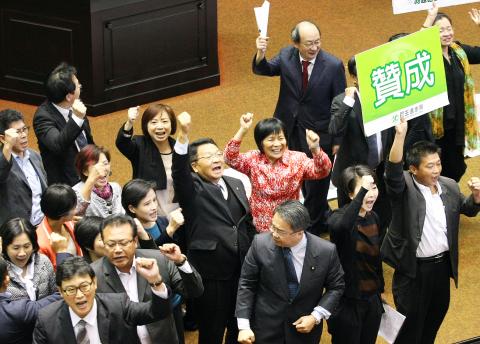With support from 15 Chinese Nationalist Party (KMT) legislators, a motion demanding the resignation of Prosecutor-General and Special Investigation Division (SID) Secretary-General Huang Shih-ming (黃世銘), who was at the center of a recent political storm, was put on the legislative agenda yesterday.
A vote on the motion could be held within a month.
The motion against Huang was jointly tabled by the Democratic Progressive Party (DPP) and the Taiwan Solidarity Union (TSU).

Photo: CNA
A second round of voting was needed after those backing the motion failed to collect more than half of the votes in the first round.
In the second round, in which only a simple majority was required to win, KMT legislators Yen Kuan-hen (顏寬恒) and Chen Ken-te (陳根德) voted in favor of the motion, joining Lee Ching-hua (李慶華), who had voted to push through the motion in the first round.
Twelve KMT legislators abstained from voting in the second round.
The motion, which demands that Huang step down immediately for his “violations of the Constitution and laws, and disregard of the legislature,” was listed on the legislative agenda following a 46 to 38 vote, with 12 abstentions.
Huang was indicted earlier this month on charges of leaking classified information in violation of the Criminal Code and the Communication Security and Surveillance Act (通訊保障及監察法) during the SID’s pursuit of an improper lobbying case involving Legislative Speaker Wang Jin-pyng (王金平).
The SID’s handling of investigations into the case led to concerns over a possible failure to uphold judicial independence and due process of law, and also wiretapping abuse.
KMT caucus whip Lin Hung-chih (林鴻池) said the KMT lawmakers who failed to vote against the motion would not face party discipline because the party did not demand in advance that caucus members toe the party line.
Lee said he would have voted in favor of the motion even if the KMT had decided to impose the whip in the case.
“Huang should have tendered his resignation of his own accord. It will take a long time to regain the public’s trust in the judiciary if he leaves now, not to mention how long it will take if he continues to resist the demand [to step down],” Lee said.

US President Donald Trump yesterday announced sweeping "reciprocal tariffs" on US trading partners, including a 32 percent tax on goods from Taiwan that is set to take effect on Wednesday. At a Rose Garden event, Trump declared a 10 percent baseline tax on imports from all countries, with the White House saying it would take effect on Saturday. Countries with larger trade surpluses with the US would face higher duties beginning on Wednesday, including Taiwan (32 percent), China (34 percent), Japan (24 percent), South Korea (25 percent), Vietnam (46 percent) and Thailand (36 percent). Canada and Mexico, the two largest US trading

ACTION PLAN: Taiwan would expand procurement from the US and encourage more companies to invest in the US to deepen bilateral cooperation, Lai said The government would not impose reciprocal tariffs in retaliation against US levies, President William Lai (賴清德) said yesterday, as he announced five strategies to address the issue, including pledging to increase Taiwanese companies’ investments in the US. Lai has in the past few days met with administrative and national security officials, as well as representatives from various industries, to explore countermeasures after US President Donald Trump on Wednesday last week announced a 32 percent duty on Taiwanese imports. In a video released yesterday evening, Lai said that Taiwan would not retaliate against the US with higher tariffs and Taiwanese companies’ commitments to

‘SPECIAL CHANNEL’: Taipei’s most important tasks are to stabilize industries affected by Trump’s trade tariffs and keep negotiations with Washington open, a source said National Security Council Secretary-General Joseph Wu (吳釗燮) arrived in the US for talks with US President Donald Trump’s administration, a source familiar with the matter said on Friday. Wu was leading a delegation for a meeting known as the “special channel,” the Financial Times reported earlier. It marked Trump’s first use of the channel since returning to the White House on Jan. 20. Citing a source familiar with the matter, the Financial Times reported that Minister of Foreign Affairs Lin Chia-lung (林佳龍) was also a part of the delegation. The visit came days after China concluded war games around Taiwan and amid Trump’s

CHIP EXCEPTION: An official said that an exception for Taiwanese semiconductors would have a limited effect, as most are packaged in third nations before being sold The Executive Yuan yesterday decried US President Donald Trump’s 32 percent tariff on Taiwanese goods announced hours earlier as “unfair,” saying it would lodge a representation with Washington. The Cabinet in a statement described the pledged US tariffs, expected to take effect on Wednesday next week, as “deeply unreasonable” and “highly regrettable.” Cabinet spokeswoman Michelle Lee (李慧芝) said that the government would “lodge a solemn representation” with the US Trade Representative and continue negotiating with Washington to “ensure the interests of our nation and industries.” Trump at a news conference in Washington on Wednesday announced a 10 percent baseline tariff on most goods